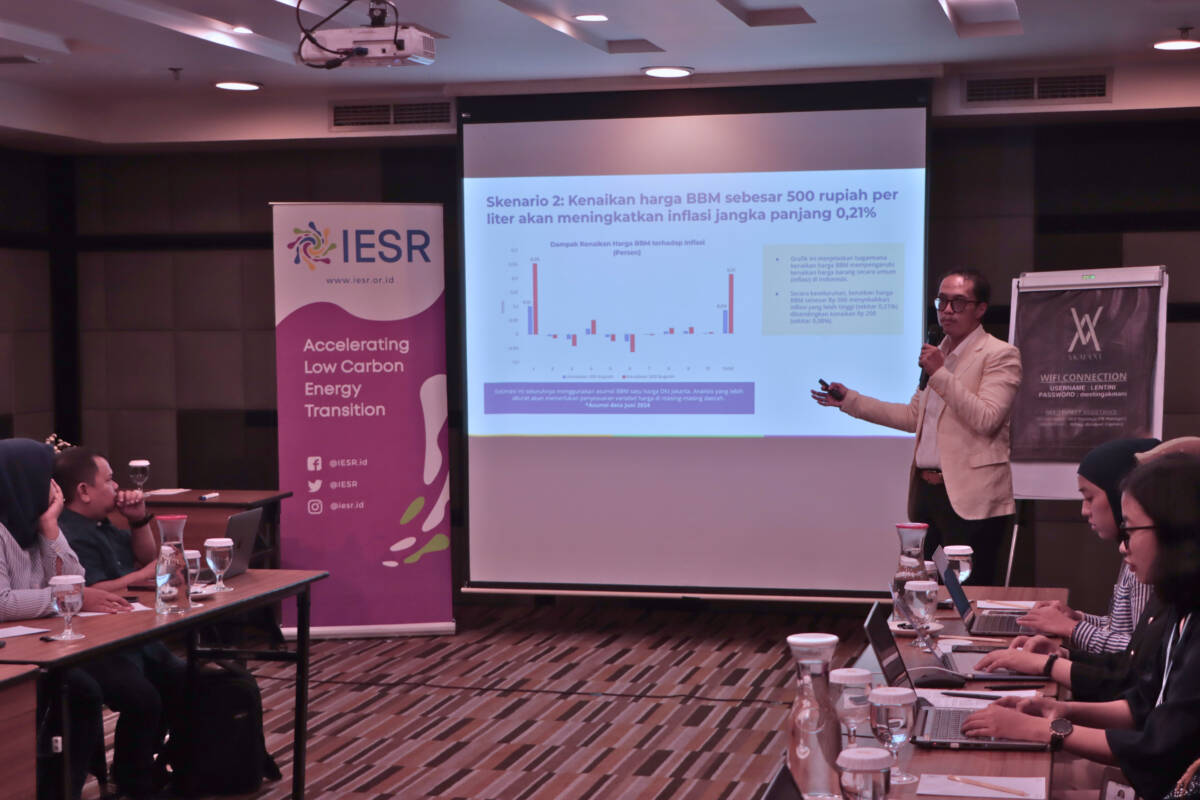Jakarta, December 17, 2024 – The government needs to anticipate the peak of pollution in various cities in Indonesia, especially Jabodetabek, which tends to occur in June to August each year, which coincides with the peak of the dry season. One way is to encourage the improvement of Indonesia’s fuel quality to Euro IV standards.
The Institute for Essential Services Reform (IESR) together with Research Center for Climate Change University of Indonesia (RCCC UI), Committee for the Elimination of Leaded Gasoline (KPBB), and Center of Reform on Economics (CORE) Indonesia and supported by Katadata Green and ViriyaENB conducted an Impact Analysis of Fuel Quality Improvement Policy on Environmental, Health and Economic Aspects. This study shows that the implementation of Euro IV fuel from 2025 to 2030 can reduce air pollution in Jabodetabek, including reducing particulate matter (PM) 2.5 pollutants by 96 percent and SOx, NOx by 82-98 percent. Meanwhile, without changes, the pollution load from vehicles is estimated to increase by around 30-40 percent by 2030, due to an increase in the number of vehicles and the number of transportation activities.
Euro IV fuel has a sulfur content equivalent to 50 ppm. In contrast, more than 90 percent of the fuel circulating in the Indonesian market is of low quality with high sulfur content, reaching 150-2,000 ppm, depending on the fuel type. The high sulfur content in fuel causes poor air quality, increased health problems, and increased medical costs.
Fabby Tumiwa, Executive Director of IESR at a media meeting (17/12) revealed that air pollution in Jakarta has added to the burden of pollution-related health costs such as pneumonia, chronic obstructive pulmonary disease (COPD), and ischemic heart disease. BPJS data shows that medical claims related to air pollution in Jakarta will almost reach Rp1.2 trillion by 2023, with ischemic heart disease contributing Rp471 billion and influenza and pneumonia Rp409 billion.
“Indonesia needs to immediately implement Euro IV supported by integrated policies, accompanied by strict supervision and enforcement. The government needs to ensure the readiness of domestic refineries to fulfill Euro IV fuel. Although it requires significant investment, government and private collaboration in technology and refinery infrastructure will bring far greater benefits to the environment, health, and economy,” Fabby said.
Ilham R. F. Surya, Environmental Policy Analyst, IESR, in his presentation said that the implementation of Euro IV will have implications for increasing fuel production costs by around Rp200 – Rp500 per liter. Therefore, the government needs to prepare fiscal space to anticipate the economic impact of the implementation of the Euro IV roadmap. In addition, the government also needs to prepare a financing scheme for increasing fuel production costs with various scenarios such as additional costs if borne by the government, charged to consumers or by limiting access to subsidized fuel for certain groups of people.
“This study specifically assesses the impact of improved air quality on three diseases out of a list of 12 diseases caused by pollution in Jakarta, namely pneumonia, ischemic heart disease, and COPD. The total cost reduction from the reduction of BPJS claims for the treatment of these three diseases in 2030 is estimated to reach Rp550 billion with details of pneumonia at Rp246 billion, ischemic heart at Rp268 billion, and COPD at Rp36 billion,” Ilham explained.
This study encourages the government to implement Euro IV by ensuring the availability of EURO IV fuel according to the roadmap, as well as the readiness of domestic refineries to provide it. In addition, although improving fuel quality is a crucial step, it needs to be supported by various other sustainable transportation policies, including the provision of convenient public transportation, tightening emission quality standards and fuel efficiency (fuel economy) of motor vehicles, shifting to electric vehicles, and implementing eco-sensitive traffic management.

